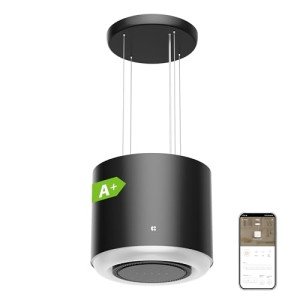Island Extractor Hoods Tools To Ease Your Everyday Lifethe Only Island…
페이지 정보
작성자 Estella Stuber 댓글 0건 조회 13회 작성일 25-05-18 07:31본문
Island Extractor Hoods: The Ultimate Guide to Choosing and Maintaining Your Kitchen's Ventilation System
In modern cooking areas, an island extractor hood is not simply a functional necessity, it also works as a centerpiece that boosts the aesthetic of the area. As open-concept living environments continue to rise in popularity, understanding the functions, benefits, and upkeep of cooker island extractor hoods becomes essential for house owners. This article will dive into the numerous elements of island extractor hoods, assisting readers make notified decisions based upon their kitchen needs.

What Are Island Extractor Hoods?
Island extractor hoods are ventilation systems developed to be installed above kitchen islands, making sure effective air purification while mixing perfectly with the kitchen's design. Unlike traditional range hood for island hoods that are typically mounted against a wall, island hoods are suspended from the ceiling, which offers more versatility in kitchen designs.
The primary function of an island extractor hood is to remove air-borne grease, smoke, steam, and smells created throughout cooking, thus enhancing indoor air quality. This is especially important in open-concept homes where the kitchen is incorporated into the living area.
Benefits of Island Extractor Hoods
There are various benefits to setting up an island extractor hood in your kitchen:
Improved Air Quality: They filter and expel toxins, making sure a much healthier cooking environment.
Style Flexibility: Available in different sizes, styles, and finishes, they can complement any kitchen design.
Improved Lighting: Many models come geared up with incorporated lighting, brightening the cooking surface area below.
Sound Reduction: Modern designs are designed to operate silently, minimizing disturbances in an open-concept design.
Improved Home Value: A well-chosen island hood can increase the aesthetic and practical appeal of a kitchen, thus enhancing property value.
Secret Features to Consider
When choosing an island extractor fans extractor hood, a number of functions must be taken into consideration:
| Feature | Description |
|---|---|
| Size | Select a hood that is equivalent to or a little bigger than the cooking surface measurement. |
| Extraction Rate | Determined in CFM (cubic feet per minute), this rate shows just how much air the hood can move. |
| Purification Type | Options include ducted (vented) and ductless (non-vented) systems, depending upon home layout and preferences. |
| Control Type | Think about user-friendly controls; alternatives include mechanical buttons, touch controls, or push-button controls. |
| Noise Level | Examine the sone rating; lower scores suggest quieter operation, important for open areas. |
| Lighting | Look for designs with built-in LED lights for boosted visibility while cooking. |
Installation Types
There are three primary setup types you can pick from for island extractor hoods:
Ducted Hoods: These utilize ductwork to expel air outside the home. They are generally more effective however require a more complicated installation procedure.
Ductless Hoods: These recirculate filtered air back into the kitchen. They are easier to set up however might require more frequent filter replacements.
Convertible Hoods: This type can be adjusted to run as either ducted or ductless, providing versatility based on the property owner's requirements.
Frequently Asked Questions About Island Extractor Hoods
What is the perfect height to install an island extractor hood?
The ideal height for setup is generally 30-36 inches above the cooking surface area. Nevertheless, this could vary depending upon the particular model and the user's height.
How do I clean and preserve my island extractor hood?
Regular maintenance is important for ideal performance.
- Tidy the exterior using a mild soap solution and a soft cloth.
- Replace or clean filters as advised by the producer.
- Ensure the ducting system is clear of obstructions if utilizing a ducted model.
How frequently should I change the filters?
For ductless hoods, charcoal filters must preferably be replaced every 6 to 12 months, while grease filters may need more frequent cleansing, such as every 2-4 weeks, depending upon use.
Are island extractor hoods energy-efficient?
Lots of designs are designed with energy-efficient motors and LED lighting choices. Try to find products that boast ENERGY STAR certifications or similar rankings.
Can I set up an island extractor hood myself?
While some may pick to undertake the installation, it's advised to employ an expert, specifically for ducted systems, to guarantee security and appropriate fitting.
Maintenance Tips for Island Extractor Hoods
To make sure durability and efficiency, consider the following maintenance practices:
Regular Cleaning: Clean grease filters, baffle filters, and the outside surface area monthly to prevent accumulation.
Check Ductwork: Inspect duct systems for clogs or damage every six months, making sure optimal airflow.
Change Filters: Follow producer guidelines for replacing or cleaning up filters to preserve air quality.

Screen Performance: If you discover minimized air flow or increased sound, it might be time to seek advice from a professional for repair work or maintenance.
island vent hood extractor hoods have evolved significantly, island extractor hood providing innovative functions and capabilities that not only boost kitchen performance however likewise raise home visual appeals. By thoroughly considering size, purification type, and setup preferences, property owners can choose the perfect island vent hood hood for their needs. Routine maintenance guarantees efficiency and resilience, making this kitchen device a valuable investment for any household. Whether updating an existing hood or setting up a brand-new one, comprehending these systems is crucial for achieving a functional and elegant kitchen environment.
댓글목록
등록된 댓글이 없습니다.